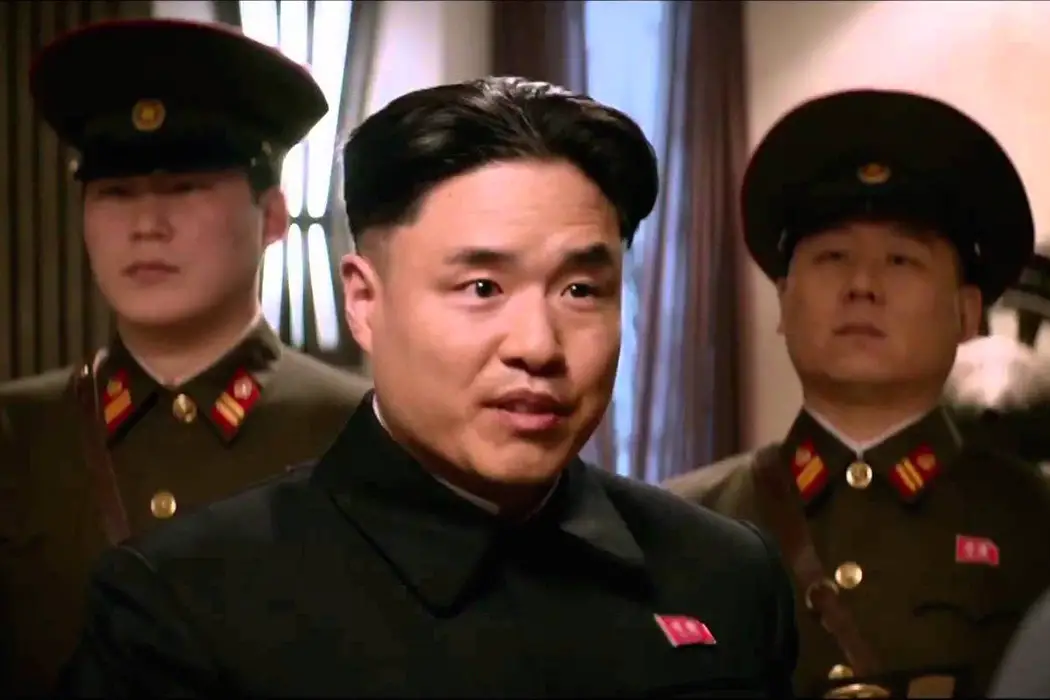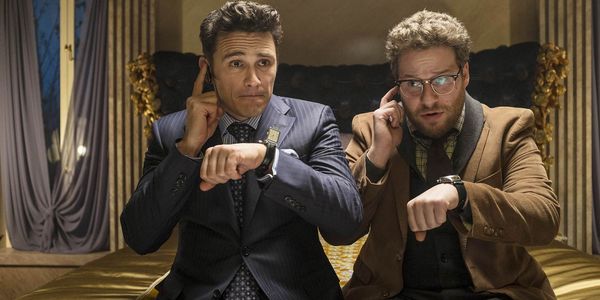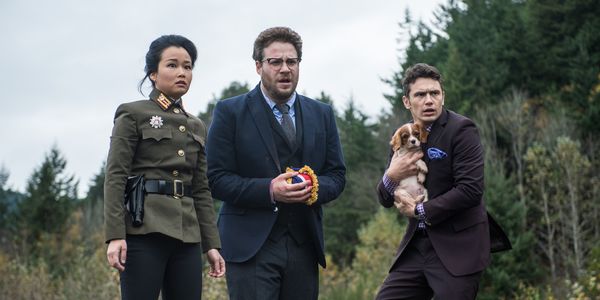Away from the Hype: THE INTERVIEW

A writer in Australia, Sean used to be a TEFL…
Sometimes, a movie is released and the hype/controversy surrounding it is too much for the movie to get out from underneath. Sometimes this means we sit down in the cinema with expectations and preconceived notions that we can’t escape.
Away from the Hype is an ongoing series looking at some of these movies years away from their initial release to see if, without all of the window dressing of hype, expectation, and controversy, the movies are actually any good or not.
The North Remembers
The movies I’ve covered so far in this feature are hyped for reasons that can apply to other movies. There are other inexplicably successful movies, other bad movies, other movies that caused outrage among trolls, and a million other movies that were the scariest of all time. The movie we’re going to talk about today, though, has earned its way onto these pages in a truly unique way. After all, it’s not often that a movie manages to enrage a tyrannical regime to the point that it goes unreleased because that regime targets the studio in a way that ruins other movies, executive’s careers, and shows that dictators really can’t take a joke.

The Interview, written by Seth Rogen and Evan Goldberg, is all about two hapless TV journalists who are sent to North Korea to interview Kim Jong Un while being co-opted by the CIA to assassinate him. It is not some hard-hitting documentary which reveals the horrors that occur in the North Korean state nor does it hope to unearth some real truths about the terrible way Kim Jong-un treats his people. It’s a bit of high concept idiocy from the people who brought you This is the End, Pineapple Express, Superbad, and Sausage Party. It’s the kind of movie Chevy Chase and Dan Ackroyd would have made in the ‘80s, only about Russia.
However, the movie caused something to snap up North, and a group of hackers calling themselves the Guardians of Peace managed to get into Sony’s servers and leak emails, internal memos, scripts, and movies that were yet to be released. From these emails we learned that Sony execs, Amy Pascal/Scott Rudin made some terribly racist jokes about Barack Obama, that 24th James Bond film Spectre was spiraling out of control, Sony’s plans for future Spiderman movies, how they planned to sue Bill Murray when he didn’t want to be involved in future Ghostbusters movies, and a bunch of other insider stuff that made Sony look very, very stupid.
All of this led to the reason we’re talking about The Interview right now: Sony decided to pull the movie from theatres, or rather they decided not to release it in theatres at all. Instead, the movie was released digitally and as an online rental (where it became Sony’s highest grossing digital release). Now, four years after this snafu, and with North Korea seemingly in a more friendly mood, it’s time to see how The Interview fares away from the hype.

The Interview (2014)
Let’s skip to the end: The Interview does not reinvent the comedy wheel. It doesn’t even reinvent the Rogen/Goldberg comedy wheel. James Franco plays an enthusiastic idiot while Rogen is a character realising that he needs to grow up, and in the end, they understand how important their real friends are a la Pineapple Express, Superbad, and This is the End.
Much like those above films, though, it does the job. There are quite a lot of laughs, it is fast-paced, and it is definitely made in their own distinctive style.
This means that it is infantile and ridiculous, but funny if you like this kind of humour: stoner-ish, lots of improvised dialogue, women spoken about simply in terms of hot/not, grown men acting like children, etc. And, in the interest of full disclosure, I’m into this kind of thing (in small doses, especially the women hot/not stuff). What keeps The Interview from collapsing on itself is the ridiculousness of the plot, as the two journalists get deeper and deeper into Kim Jong-un’s world and the writers pile on the absurdities.
Randall Park plays Kim as a bit of a geek and a fanboy who wants to impress Franco’s character with tanks, cars, basketball, and margaritas. He is portrayed as full of deep feelings and insecurities, and also extreme rage and genocidal tendencies. The Interview leans into the absurdity of the North Korean leader’s cult of personality while at the same time trying to show that, for all of the silly propaganda about him – with this movie focusing heavily on the rumour that he neither pees nor poos – he is still a very dangerous individual with 24 million starving people in his country.
That is not to say that this is a political movie. Obviously, it falls on the side that Kim Jong-un sucks, and towards the end there is some good stuff about Kim’s terrible reign, but the movie also gives Kim a chance to voice his own side of the argument and criticise America’s overflowing prison system and rampant poverty (though these scenes all occur while Rogen and Diana Bang are having a bloody brawl in the producer’s control room so it’s easy to lose focus). It is a strange mix for a movie like this to have. It wants to paint Kim in black and white terms of villainy but also wants to turn the spotlight on America’s faults, while not really saying that much and making the critic of America a deranged villain who claims to have no butthole.
Out of the two leads, Rogen shines brighter. Franco’s dopey smile and character’s idiocy produces some laughs, but Rogen manages to get the better set-pieces, the more satisfying romantic plotline, and avoids getting stuck in an endless parade of decadent montages, which keeps happening to Franco.
Conclusion
There’s an incredible Tony Zhou video about the dynamic comedy of Edgar Wright. In it, he outlines how modern comedies have become too reliant upon improv and shot/reverse shot conversations. The Interview is the same. Most of the punchlines come in rapid-fire conversations between Rogen and Franco, and after the first few it becomes repetitive, with the same going for the erratically cut montages that keep happening and are all basically the same: people act nuts and have a good time set to music.
The film really gets laughs when it moves more towards physical comedy and set pieces, e.g. the tiger sequence (and aftermath), the finger biting, and the awkward hands-free sex scene, which are hilarious. However, these sequences are few and far between. This is a shame, as the film works better when it goes big, whether it’s with violence, Katy Perry-inspired heartbreak, or an awkward sex scene. The shot/reverse shot dialogue has become such a staple of comedy that it’s as rote as a cat jumping out for a cheap scare in a horror movie, and we need something more.
Away from the hype, The Interview is a perfectly fine comedy movie. I’m not sure any comedy could really live up to the hype of nearly starting an international incident between two nuclear forces, but this movie does its best.
What are your thoughts on The Interview?
Does content like this matter to you?
Become a Member and support film journalism. Unlock access to all of Film Inquiry`s great articles. Join a community of like-minded readers who are passionate about cinema - get access to our private members Network, give back to independent filmmakers, and more.
A writer in Australia, Sean used to be a TEFL teacher and is now an academic consultant. He has been published in The Big Issue, Reader's Digest, Talk Film Society, and Writer Loves Movies. His favourite movie is The Exorcist and he prefers The Monster Squad over The Goonies. He is also the co-host of the Blue Bantha Milk Co. YouTube channel.













